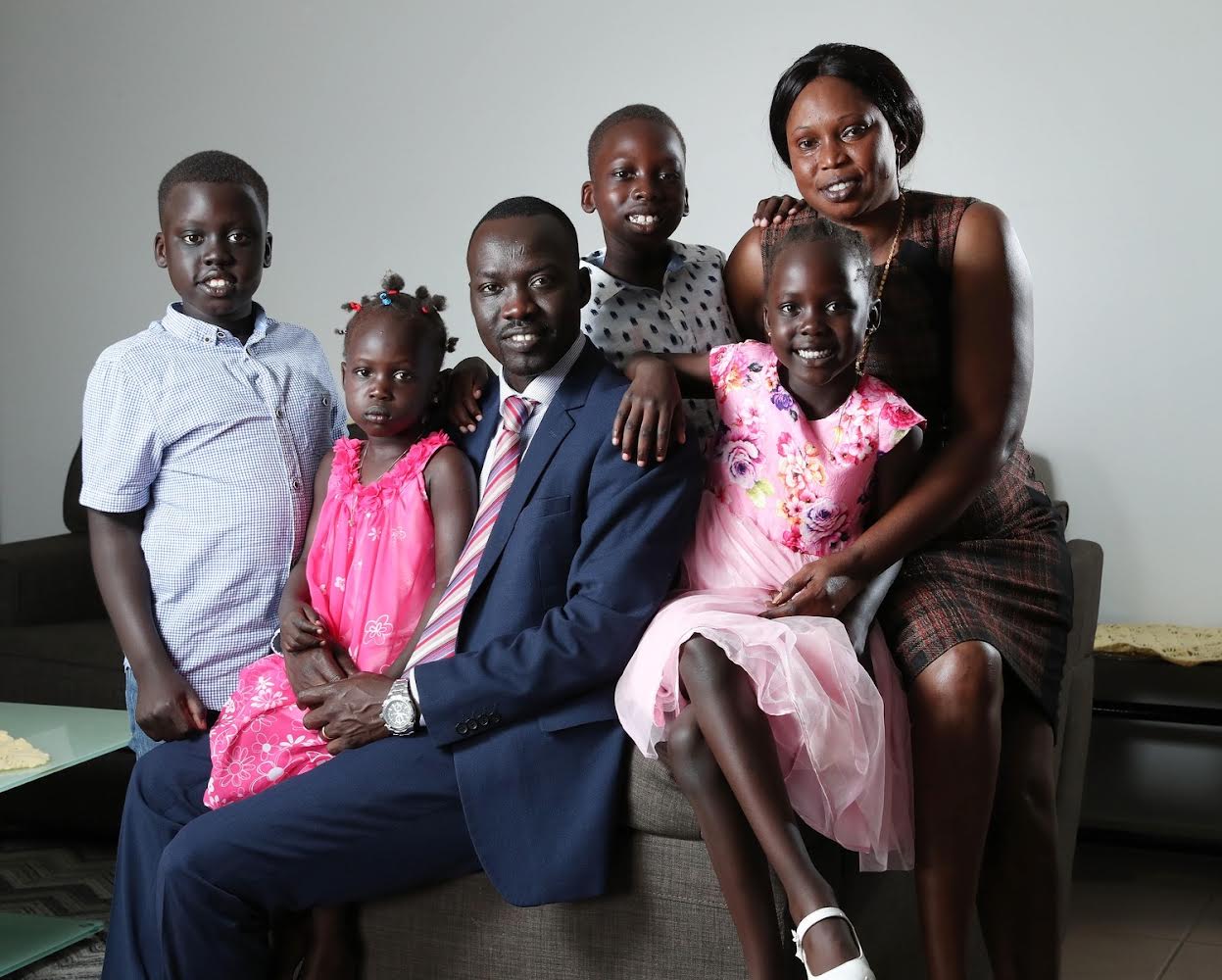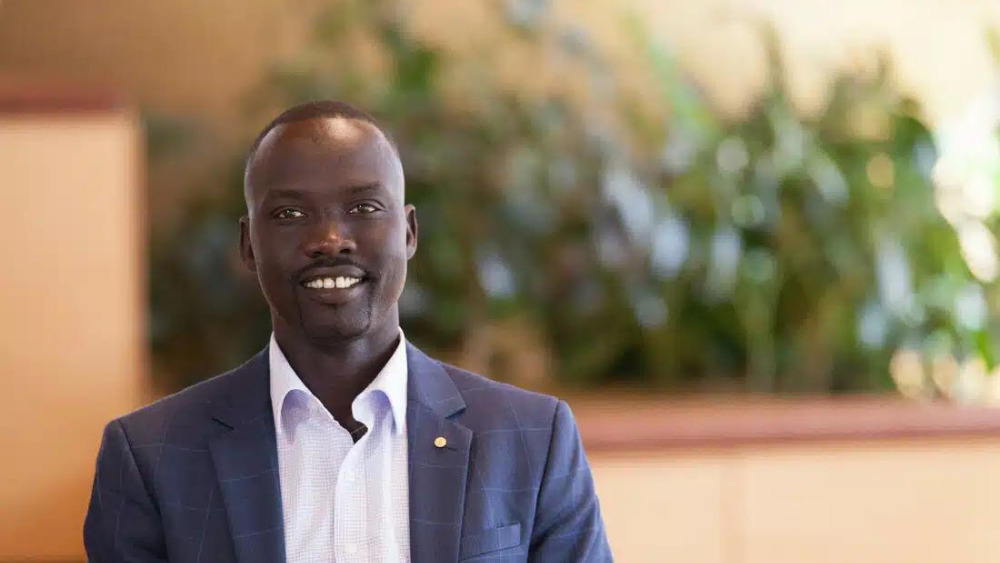Former South Sudanese refugee Elijah Buol is the new CEO of Act for Peace, where he aims to bring hope to children who are traumatised by war and disaster. He has received numerous awards for advocacy and community services, including Australian of the Year QLD Hero Award in 2019.
I was born in South Sudan in 1985, two years after the civil war began. I was born into a Christian family, the only boy among four sisters. My mum’s faith was very strong – she was a laywoman in the Anglican Church – and as a little boy, I learned the value of hope and compassion. She used to read the Bible to me in our language, Dinka, and the verse that really stuck with me was Colossians 3:12: “Therefore, as God’s chosen people, holy and dearly loved, clothe yourselves with compassion, kindness, humility, gentleness and patience.”
I saw bombs being thrown at us all the time, and when we saw gun barrels, we would run to hide behind trees. If you were scared that a bomb was coming, you’d find a big hole in the ground where you could hide.
After a while, it became normal for us because we saw it every day. But you were always thinking, when would that bullet land on you? It is still the same today with these children in the conflict in Gaza and Israel and between Ukraine and Russia.
The war in Sudan separated a lot of families in the 1980s. As a result of the war, my mum was in the town of (Bor in central South Sudan) with my sisters, and I was in our little village with dad. When I was six, we got the news that my mum had been killed through crossfire. We didn’t see Mum’s body, but there were eyewitnesses who said she was shot; many people were killed at the time and the bodies put into the River Nile.
It’s hard when you lose your mum at the age of six; you miss a lot of things, but you just have to be hopeful and push ahead in life.
My sisters went to the north of Sudan, to Khartoum, with my aunty, and my dad said, “Look, your safety is very important because we don’t know when this war will end and who it will take. So it will be very important to go and find a safe place where you can survive.” So my dad gave me to my cousin, who was travelling to a displaced persons camp along the border of Uganda and South Sudan. We travelled for weeks on foot because it’s a vast country and we walked from the northern part of South Sudan to the southern part. There’s no road, so we had to cross rivers and creeks and walk in the bush.
In 1996, when I was at the refugee camp in Uganda, my uncle managed to make a radio call through the UNHCR (the UN Refugee Agency). The UNHCR went and looked for me in the camp, and conveyed the news that my dad had passed away. He was very engaged in the conflict and was fighting for the freedom of South Sudan. He had been shot and died from his wound, but again, I never saw his burial place.
I was shocked, but I never actually cried when the news came. I did not shed a single tear. I think it was because I accepted the reality and hoped that God had a reason for us to exist and he had a reason for taking us.
It’s hard when you lose your mum at the age of six; you miss a lot of things, but you just have to be hopeful and push ahead in life. That allowed me to say, when that news of my dad came, “Look, this is just another tragedy. But how can I hold onto my hope?” There’s a reason for us to exist. And God will always be on my side to allow me to be hopeful and give me a space where I can overcome those challenges.
All along I’ve been living on the mercy of those who’ve got hope and kindness and compassion and humanity.
Faith has played a critical part in my life up to now; it has allowed me to trust God when he said to us, “I will be there for you.” It’s a really affirming and reassuring thought that, regardless of the difficulties we’re in, God has created us equal and his compassion for us and his kindness, mercy and grace are the anchors that keep us moving through all those challenges.
In the refugee camp, you live ration by ration, one meal a day sometimes, and it’s not a balanced diet. You just eat maize flour and beans, or if you’re lucky, you get a bit of oil. But the great thing was, it was safe. You didn’t have to run away from bullets or bomb bombardment from the air. It was tough being there with no parents. But I learned how to build connections and relationships and feel safe among the adults who were there.
I spent seven years in Uganda, at two refugee camps, which allowed me to engage in education. I lived with other young men and we went to a school under the trees together, and I was able to finish my primary school education there in 2000.
Then I got a UNHCR scholarship to go to a boarding school and they said, “Look, we’ll take you to Australia because it’s a safe place where you can explore your potential and do what you’re passionate about.” So, I ended up here as an unaccompanied minor in 2002.
All along I’ve been living on the mercy of those who’ve got hope and kindness and compassion and humanity, and I think that’s what really makes me who I am today.

Elijah Buol, centre, his wife Ashol and children Deng 14, Buol Jr 12, Agaw 11 and Yar, 9.
Act for Peace is an international humanitarian agency of the National Council of Churches Australia that empowers displaced people to rebuild their lives through locally-led protection policy, advocacy and programs. Act for Peace’s purpose is to create a world where people uprooted by conflict and disaster have a safe place to belong.
According to UNHCR, more than 114 million people worldwide have been forced to flee their homes, due to conflict, persecution and human rights violations. Children account for 30 per cent of the world’s population but comprise 40 per cent of all forcibly displaced people. Buol says: “With staggering numbers, our humanity is calling for us to be more compassionate. It is our collective responsibility as people blessed with God’s compassion to extend our hand to those who need our compassion and kindness at this critical time”.
With the growing unprecedented demand for Act for Peace’s programs, financial support is required. To support Act for Peace, click here.
Email This Story
Why not send this to a friend?


